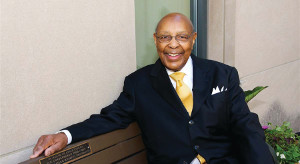connect
REMEMBERING LOUIS STOKES
 photo: Daniel Milner
photo: Daniel MilnerLouis Stokes served many roles during his remarkable life: He was a civil rights leader, a congressman for 30 years, a member of the Mandel School faculty, and a beloved friend and mentor.
In mid-July, we heard the devastating news that our dear friend and colleague, Congressman Louis Stokes, had been diagnosed with cancer. That day, I walked into my office to call him. But my phone was already ringing. It was Congressman Stokes.
"Cleve, I want you to hear the news from me," he said. "And I wanted to thank you for all you've done and what we've shared together in our friendship."
The man was dealing with the most terrible news a person can receive, but he was calling to comfort and thank me. That was Congressman Stokes—a kind, generous spirit always thinking of others with gratitude, giving every person his complete time and attention, and serving as a model for how we should live our own lives.
As we talked about projects in the short time that followed his diagnosis, we never did say goodbye. We simply continued to express our gratitude to each other.
As I write this remembrance, it is hard to grasp that he is gone. He was a giant in our lives. Born in poverty, Mr. Stokes became a lawyer who argued before the U.S. Supreme Court, a trailblazing civil rights leader and the first African-American congressman from Ohio, representing Cleveland for 30 years.
That history is rightfully celebrated, as is his role at the Jack, Joseph and Morton Mandel School of Applied Social Sciences, where his impact is immeasurable.
Congressman Stokes became a Distinguished Visiting Professor at the Mandel School in 1999. This was not an honorific title; he was a professor—teaching as a guest lecturer in a variety of classes each semester, preparing his lectures thoughtfully, helping students with their elevator speeches and participating in faculty meetings to help shape the school's direction. He kept current on all the issues from social policy to civil rights, and—when he used his vast resources and connections—sometimes had more information than our faculty.
It seemed natural to us that he found a home at the Mandel School. As a distinguished lawyer and former lawmaker, he easily could have taken an academic appointment at a law school. But our mission—to address social ills and build stronger communities—touched the soul of this man, who had spent decades battling to ensure that those who did not have a voice would be heard.
It is thanks to his passion that we have the Stokes Fellowship Program at the Mandel School, which educates African-American and Hispanic students in community development; it still exists today, thanks to the support of generous donors. One year, several Stokes Fellows gathered to thank Mr. Stokes for what he had taught them in the classroom and through his life's work. They were his living legacy, the fellows explained, carrying out his mission of social justice for all. My colleagues and I deeply miss our friend. We miss his constant smile and the sparkle in his eye, his dignity and humility.
But like those Stokes Fellows, we are inspired—by both the gentle man and the national icon—to make a difference in the lives of others.
Congressman Louis Stokes died Aug. 18, 2015. He was 90.






